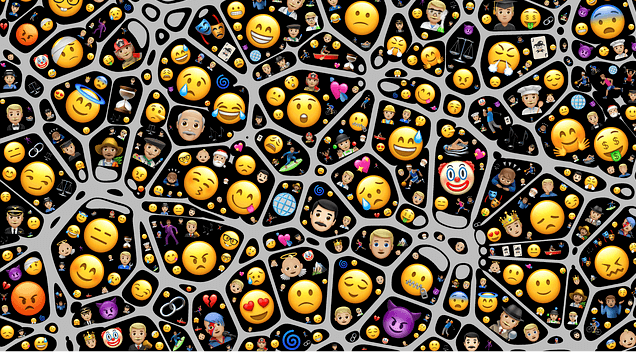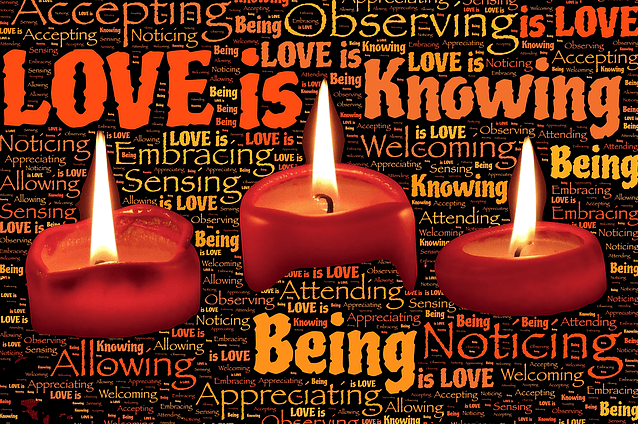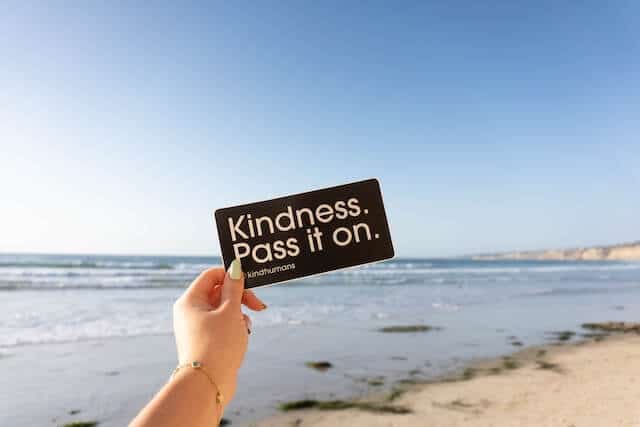How to Respond to Vulnerability: Empathy And Compassion
When someone opens up and expresses their vulnerabilities, it’s seems pretty logical to respond with empathy and compassion, right?
However, many of us struggle with knowing how to react in these situations… We may fear saying the wrong thing or inadvertently making the person feel worse.
This article will provide an open discussion with practical tips for effectively communicating with someone who is feeling vulnerable and trying to open up.
Before diving into specific strategies for responding to vulnerability, it’s crucial to understand the significance of empathy and compassion.
Brené Brown, a renowned researcher on shame and empathy, distinguishes empathy from sympathy. Sympathy often involves trying to find the “silver lining” in someone’s pain, while empathy involves truly understanding and connecting with their emotions.
Avoid Making the Person Feel Worse
Be Present and Listen
When someone opens up about their vulnerabilities, what he really is asking for is attention and understanding: It’s crucial then to be fully present and actively listen.
Not interrupting the person’s train of thought would also be a great idea, so avoid the temptation to jump in with your own stories or solutions…
Instead, give your partners plenty of space and time to express themselves and truly listen to what they’re saying.
Be there! Show genuine interest and avoid distractions to demonstrate that you care about their feelings.
Validate Their Feelings and Experiences
Validation plays a significant role in responding to vulnerability.
In other words : we want to respond in a way that communicates understanding and empathy without necessarily agreeing with the person’s perspective. For example, if your partner interprets a forgotten task as disrespect, you can validate their feelings by acknowledging how your actions might have made them feel that way.
(and by the way, it could also be the perfect spot to explain why you made them…)
So, validation helps diffuse tension and fosters a sense of being heard and understood.
Here is Naomi Feil and her speech about Validation and communication through empathy and compassion at her Ted Talk in Amsterdam.
Avoid Making It About Yourself
While it’s natural to want to connect with others by sharing similar experiences, it’s essential to avoid shifting the conversation solely about yourself.
Excessive self-disclosure can overshadow the person’s attempts to come out of their shell and instead cause them to raise their guard again. Focus instead on support and listening.
Remember that this is their moment to be heard, and your role is to provide a safe space for them to express themselves freely. Your time to talk and tell will then come naturally along the way.
Don’t Try to Fix Everything
When someone shares their vulnerabilities, it’s not always necessary or helpful to jump into problem-solving mode (well, sometimes this is even counter-productive, as your partner could feel under the stress to give you all the details and positively accept any solution you enthusiastically propose…).
Men, in particular, tend to struggle with this aspect (believe me,I know veeeery well!….)
Here is an article from YourTango.com with a slight funny twist on the topic, nice one!
But sometimes people just need someone to listen and empathize with them, without trying to fix anything.
Think about it for a second : by being a supportive sounding board, you allow them the space to process their thoughts and maybe even find their own solutions!
Offer Support and Care
Showing support and care is the essential answer when someone is feeling vulnerable.
Responding with empathy and compassion can help individuals feel less alone and more willing to share their emotions and experiences. Let them know that you are there for them and that they can lean on you during difficult times.
Many times, a simple act of kindness, like offering a hug, can go a long way in providing comfort and support (listen, wouldn’t you appreciate a warm hug in “those moments”???) .
And what about the concept of “Emotional Resonance“? : Follow the link to learn more!
| My friend, you can’t even imagine what a need of love there is out there… |
Practice Self-Awareness
Responding to vulnerability requires self-awareness.
Why do we tend to race conversation hastily to the point where is our turn to tell our issues, our victories and frustrations, our points of view…
Let´s be mindful of our own tendencies to compete with others’ misery or make our problems seem worse. Avoid falling into the trap of comparing or trying to one-up the person’s vulnerabilities.
Instead, open up to the best of yourself : focus on understanding their emotions and providing the support they need.
Yes, Awareness is so important and incredibly negleted nowadays… | Here is a TED´s video from Yongey Mingyur about how to tap into your awareness
But “How Do YOU know if Your Vulnerable?”
You wanna know if what you are feeling right now is some sign of your vulnerability showing up, don´t you?
Well, vulnerability in people can often manifest as physical discomfort, but you could also show other different emotions or compulsive behaviors….
Check out the following sensations, as they can signal that you’re in a vulnerable state :
- Panic Attacks: One of the most apparent signs of vulnerability is experiencing panic attacks or intense anxiety. These overwhelming feelings of fear and distress can surface when you feel exposed or unsafe.
- Feelings of Unsafety: Vulnerability often goes hand in hand with a heightened sense of insecurity or unsafety. You may constantly feel on edge or threatened, even in non-threatening situations.
- Intense Need for Love and Acceptance: A strong, unrelenting desire for love, acceptance, and validation from others can be a clear indicator of vulnerability. You may seek reassurance and affirmation to fill emotional gaps.
- Avoidance of Emotional Risks: If you find yourself avoiding situations or relationships that involve emotional risk, it suggests a vulnerability to potential emotional pain. This avoidance is a protective mechanism as you try to shield yourself from hurt.
Some More Aspects
- Physical Discomfort: Vulnerability can manifest physically as well : You may experience sensations like a tight chest, shallow breathing, a racing heart, or a knot in your stomach when you’re in a vulnerable state.
- Tendency to Overthink and Overanalyze: Vulnerable individuals often tend to overthink and overanalyze situations and relationships. This constant rumination can lead to heightened stress and anxiety.
- Difficulty Setting Boundaries: Struggling to establish and maintain healthy boundaries with others can signal vulnerability. You may find it challenging to assert your needs and protect your emotional well-being.
- Fear of Rejection or Abandonment: An intense fear of being rejected, abandoned, or left alone can be a strong sign of vulnerability. You may go to great lengths to avoid situations that trigger these fears.
- Strong Emotional Responses: Vulnerability can lead to intensified emotional reactions. You may cry easily, become deeply affected by sad or touching stories, or feel a heightened sense of empathy.
- Difficulty Trusting Others: A reluctance to trust others, especially in intimate relationships, can indicate vulnerability. Past emotional wounds may make it hard to open up and be disposable with someone new.
Should You fear Vulnerability?
But hey, do not make a mistake here! Always remember that vulnerability is a natural part of the human experience. Recognizing these signs within yourself is just the first step in understanding and embracing your vulnerability.
Rather than viewing vulnerability as a weakness (link), consider it an opportunity for growth, connection, and self-discovery, because it is!
Seeking support from friends, family, or a therapist can also be instrumental in navigating your vulnerability in a healthy and constructive way.
What Are Other Possible Symptoms Of Vulnerability?
Aa already said, vulnerability is an intricate and deeply human aspect of our emotional lives. It manifests through various symptoms, both emotional and physical. Recognizing these symptoms is crucial for understanding and navigating vulnerability effectively. Here is a further list of symptoms that may indicate you are experiencing vulnerability.
Be mindful and explore their impact on your well-being.
Symptoms of Vulnerability
- Heightened Emotional Sensitivity: Vulnerability often amplifies your emotional responses. You may find yourself becoming more sensitive to your own feelings and the emotions of others, experiencing them more intensely.
- Difficulty in Decision-Making: When you’re vulnerable, decision-making can become challenging. You may struggle to make choices due to fear of making the wrong ones or concerns about potential consequences.
- Perfectionism: Vulnerability may manifest as perfectionism, where you place unrealistic expectations on yourself. You may believe that by achieving perfection, you can shield yourself from judgment and criticism (uhm…this could be a good topic for our Time Management category, since perfectionism is a fierce killer of your productivity. More on productivity issues here).
- Self-Criticism: Vulnerability can lead to heightened self-criticism. You may constantly scrutinize your actions and behaviors, believing that self-improvement is the key to avoiding rejection.
- Negative Self-Talk: Negative self-talk becomes more prevalent when you’re vulnerable. You may engage in self-deprecating thoughts, doubting your worth and abilities.
- Difficulty in Trusting Others: Vulnerability often makes it difficult to trust others, especially in intimate relationships. Past emotional wounds may create a reluctance to open up and be vulnerable with new people.
More Symptoms To Notice
- Isolation: Vulnerability can lead to feelings of isolation as you withdraw from social interactions. You may isolate yourself to protect against potential emotional pain.
- Excessive Worry: Vulnerability is often accompanied by excessive worry. You may find yourself constantly anticipating negative outcomes, which can contribute to anxiety.
- Impaired Self-Esteem: Your self-esteem may suffer during vulnerable periods. You may struggle with feelings of inadequacy and low self-worth.
- Hypersensitivity to Rejection: Vulnerability can make you hypersensitive to rejection. Even minor perceived rejections can evoke strong emotional reactions.
- Loss of Appetite or Overeating: Vulnerability may affect your eating habits. Some individuals lose their appetite, while others may turn to food for comfort, resulting in overeating.
- Procrastination: Vulnerability can lead to procrastination as you avoid tasks that might expose you to judgment or failure.
- Difficulty Expressing Needs: Vulnerability often translates into difficulty expressing your needs and desires to others. You may fear rejection or disappointment if your needs are not met.
- Difficulty in Accepting Compliments: When vulnerable, you may struggle to accept compliments graciously. You might deflect or downplay positive feedback.
- Perceived Lack of Control: Vulnerability can create a sense of powerlessness and a perceived lack of control over your life circumstances.
Impact of Vulnerability Symptoms
Understanding the impact of vulnerability symptoms on your life is crucial.
Following are some of the possible consequences from underestimated issues :
- Impaired Relationships: Vulnerability symptoms can strain relationships, making it challenging to connect with others authentically.
- Reduced Well-Being: Emotional and physical symptoms of vulnerability can lead to reduced overall well-being, affecting your mental and physical health.
- Stifled Personal Growth: Vulnerability symptoms may hinder personal growth and self-discovery, preventing you from reaching your full potential.
And here is Brené Brown again with her insights about the consequences of closing off the parts of us that could show us more vulnerable…but “invulnerability” has a price to pay…
(And by the way, I wrote a full lenght article with the title : “Why do I shut down emotionally?“. Ckeck it out here).
Building Strong Relationships Through Empathy
Like we already learned in numerous blog posts, by consistently responding with Empathy and compassion, we can build stronger relationships where individuals feel safe to share their vulnerabilities.
Again, Empathy fosters connection and promotes a sense of understanding and acceptance. Remember that though there is no magic formula for responding perfectly, the more you practice empathy and validation, the more likely you are to create meaningful connections with others.
And since we are already deep in the discussion, let´s jump another level and examine another fundamental question :
Is Vulnerability a Choice?
In the tapestry of human emotions, vulnerability is a thread that weaves us together, creating connections and shaping our experiences. But is vulnerability a choice, or is it an involuntary state that we find ourselves in from time to time? This question takes us further on a journey into the depths of authenticity and self-discovery. Let’s see…
Can You Really Choose vulnerability???
The question of whether vulnerability is a choice is not easily answered with a simple yes or no. It’s more nuanced than that. Here’s why :
1. The Nature of Vulnerability
Vulnerability often arises in response to life’s circumstances. It can be triggered by various factors, including personal experiences, relationships, and external events.
This is a natural and automatic response : so in this sense, you cannot choose to be vulnerable or not.
But while we may not choose these triggers, we do have a choice in how we respond to them. Do you see how powerful this can be?
2. Embracing Vulnerability
The choice to embrace vulnerability lies in our willingness to be open and authentic. It involves recognizing vulnerability’s presence, acknowledging the symptoms, and deciding to confront and navigate them.
3. Choosing Authenticity
Authenticity and vulnerability are intertwined. To be authentic means being true to yourself, and vulnerability is a key component of that truth. Choosing authenticity involves embracing vulnerability as an essential aspect of who you are.
4. Empowering Yourself
Recognizing that vulnerability is part of the human experience can empower you to make conscious choices. You can choose to acknowledge vulnerability, seek support, set boundaries, challenge negative beliefs, and practice self-compassion.
The Power of Choice
Here is Jenna Johnson on the power of choices, and how they carve your future and that of the people surrounding you.
This touches me personally : I am an Immigrant. I left italy after 44 years and moved with my family in Germany. I spoke no german, I had no connections and even nowhere to sleep for the night…
| I was burning bridges… |
While we may not always have control over the circumstances that lead to vulnerability, we do have a say in how we navigate it. It’s in these choices that we find the true fruits of vulnerability.
We do have the power to choose the direction of our future, be that 5 years from now or the coming 20 seconds. The moment you start really using this concept for your benefit, everything is going to change.
1. Choosing Connection
Vulnerability can lead to deeper connections with others. When we choose to open up and share our true selves, we create opportunities for meaningful relationships.
Again, paraphrasing the old-truly business concept of supply and demand : There is a massive demand for love and connection on this earth right now…and the supply right now is scarce and inattentive… (= you are NOT alone + START making a difference!)
2. Choosing Growth
Vulnerability can be a catalyst for personal growth and self-discovery. By choosing to confront vulnerability and its symptoms, we embark on a journey of self-improvement and resilience.
3. Choosing Self-Compassion
In the face of vulnerability, we can choose to be kind and compassionate to ourselves. Self-compassion allows us to navigate vulnerability with greater ease and acceptance.
And, speaking of Empathy and compassion, what about self compassion? Go figure, I wrote a whole article about it , enjoy!
Conclusion
So to recap :
How to respond to Others’ Vulnerability?
- Listen Actively: When someone shares their vulnerability, be fully present and listen without judgment or interruption.
- Avoid Judgment: Resist the urge to judge or offer immediate solutions. Instead, acknowledge their feelings and experiences.
- Offer Support: Let the person know that you are there for them and that they can lean on you for support. Sometimes, a simple act of kindness, like offering a hug or a listening ear, can make a significant difference.
- Practice Patience: Understand that vulnerability can be a delicate state. Give the person the time and space they need to express themselves fully.
- Empathize: Show empathy by validating their feelings and experiences. You don’t have to agree with everything they say, but your understanding and empathy can provide comfort.
Here are some more insights about Human Empathy from mindtool.com
Are Empathy And compassion the Smart Answer?
Responding to vulnerability requires empathy and compassion, as well as active listening, and validation. By avoiding actions that make the person feel worse, focusing on their experiences rather than your own, and providing support without trying to fix everything, you can effectively communicate with someone who is feeling vulnerable.
Building strong relationships through empathy contributes to a supportive and understanding environment where individuals feel safe to express their emotions. Remember, responding to vulnerability is a continuous practice that can greatly impact the quality of your connections with others.
And finally, is vulnerability a choice? It’s not a simple yes or no; it’s a complex interplay between life’s circumstances and our responses. What we can choose is how we embrace vulnerability, how we navigate its symptoms, and how we use it as a tool for growth, connection, and authenticity.
In the end, vulnerability is a choice in the sense that we have the power to decide how we respond to it. Embracing vulnerability can lead to a richer, more authentic life filled with meaningful connections and personal growth. So, why not choose to embrace the power of vulnerability?
For it is in our vulnerability that we discover the true beauty of being human.
Would you really want to miss it?









